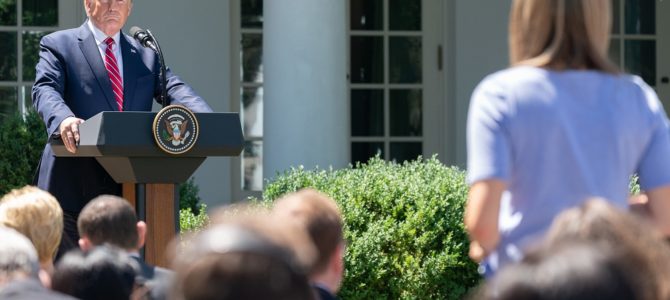
Chris Wallace has had it with President Trump. The respected Fox News host on Wednesday accused the president of waging an unprecedented war on press freedom.
“I believe that President Trump is engaged in the most direct sustained assault on freedom of the press in our history,” Wallace said at the Newseum, a media museum in the nation’s capital.
It’s no surprise the line drew applause from those in attendance. Trump’s bitter war with the press is well documented. Unfortunately, Wallace’s comments only give credence to the president and his defenders, who charge that the DC press corps is in the “fake news” business.
History shows there is a long, messy tradition of American presidents quarreling with the press. Sometimes, however, presidents took more stringent actions that directly infringed on press freedom. Thomas Jefferson famously despised newspapers—and “the malignity, the vulgarity, and mendacious spirit of those who write for them”—but it was his predecessor who took the most chilling actions against freedom of the press.
During the Quasi-War with France (1798-1800), John Adams signed the Alien and Sedition Acts, which essentially made it a federal crime to criticize Adams or the Federalist-led government. The legislation resulted in the arrest, prosecution, and conviction of many prominent figures, including Philadelphia Aurora editor Benjamin Franklin Bache, who had accused Adams of monarchical ambitions and called the president “blind, bald, crippled, toothless [and] querulous.” Bach died of yellow fever while awaiting trial.
Abraham Lincoln might be America’s most revered president, but entire books have been written about his complicated relationship with the press, which reached a fever pitch in summer 1861, when hundreds of newspapers and editors were menaced by federal agents, Union troops, and unruly mobs. So many Democratic editors and other anti-Republican voices ended up imprisoned at Fort Lafayette in New York Harbor that the facility eventually became known as “the American Bastille.”
Within a week of the outbreak of World War I, Woodrow Wilson created by executive order the nation’s first “ministry of information,” which Boston University professor Christopher B. Daly described as a “propaganda machine.” That same year, Wilson signed the Espionage Act, which can be used to prosecute journalists covering leaks and undermines efforts to report on government secrets. The legislation was used by the Obama administration to prosecute at least 10 people, more than all previous administrations combined.
Finally, let’s not forget Richard Nixon, who attempted to stop The Washington Post and The New York Times from publishing the Pentagon Papers, which exposed inconvenient truths about the Vietnam War.
Are Words Worse than Actions?
Press freedom is one of the most cherished and important rights in the Constitution. There’s a reason the Founders guaranteed it in the First Amendment of the Constitution. “Our liberty depends on the freedom of the press, and that cannot be limited without being lost,” Jefferson wrote in a 1786 letter to Dr. James Currie.
For all his bluster and harsh language toward the press, Trump has done little to encroach on the press’s actual freedom. No meaningful legislation curtailing press freedom has been signed or proposed. No concerted effort to prosecute leakers has occurred, despite the flood of leaks damaging the president.
In truth, what Wallace describes as Trump’s “direct sustained assault on freedom of the press” is mostly the president bickering over how he is covered. This is not to say Trump’s Twitter outbursts are desirable, appropriate, or benign. Government officials’ words carry power and can have a chilling effect on speech, especially when that official holds the most powerful seat in the land. (No chilling effect seems to be evident in this case, however, perhaps because the press relishes the spat as much as the president seems to.)
Appropriateness aside, Trump’s cries of “fake news” are not as egregious as the legislative and executive actions many of his predecessors have taken, which included passing unconstitutional legislation, broadening federal powers, and using the machinery of government to imprison journalists and shutdown publishers.
By forgetting these basic historical events—the Alien and Sedition Acts and the Pentagon Papers are taught in most introductory American history courses—Wallace will no doubt win favor from his peers, many of whom are outraged at the president’s hostility toward them. But criticism of the press is not suppression of the press or an actual “assault on freedom.” And by making such dubious claims, Wallace only further erodes trust in media and gives ammunition to those crying “fake news.”








